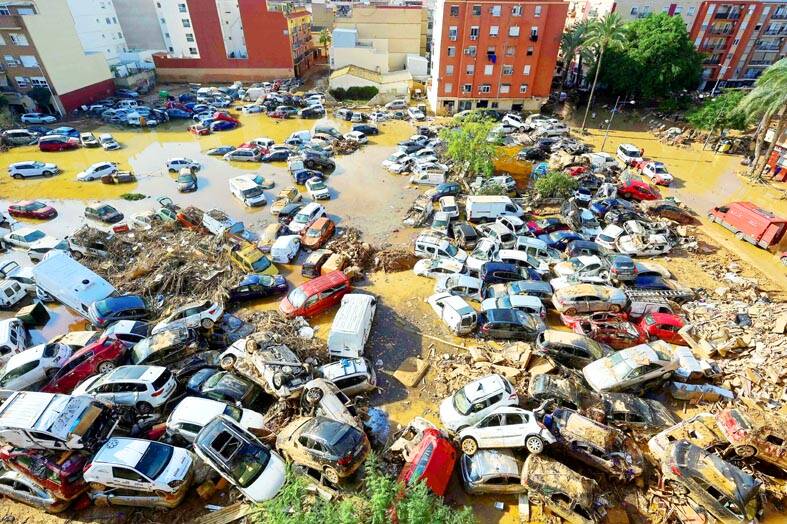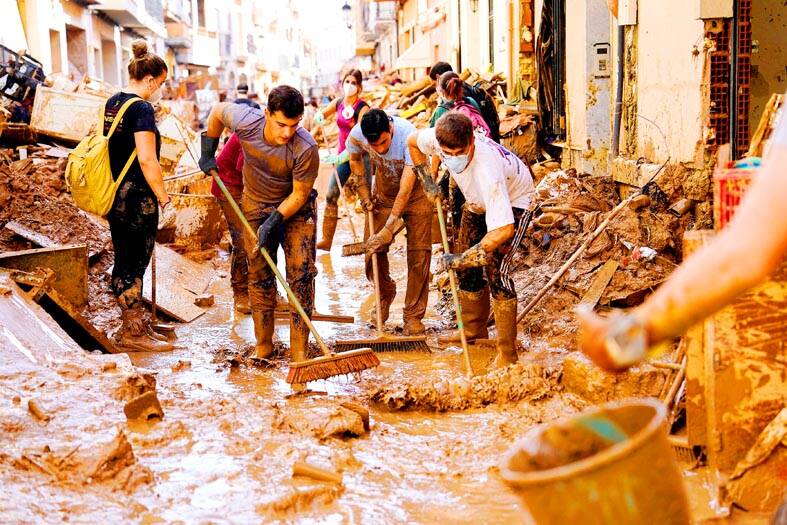People in the EU are being advised to stockpile enough food, water and essentials for 72 hours as part of a European strategy that aims to increase readiness for catastrophic floods and fires, pandemics and military attacks.
Outlining its first preparedness strategy, the European Commission said it wanted to encourage citizens to take “proactive measures to prepare for crises, such as developing household emergency plans and stockpiling essential supplies.”
The strategy was partly inspired by plans in Germany and the Nordic countries, which have distributed public information pamphlets and devised apps advising people what to do in the event of a military attack or other national crisis.

Photo: AFP
“We are saying to member states: 72 hours of self-sufficiency is what we recommend,” European Commissioner for Equality, Preparedness and Crisis Management Hadja Lahbib told reporters.
Asked about what citizens should stockpile, she referred to a video on her social media, in which she presents an emergency bag.
To a soundtrack of off-key jazz piano, Lahbib is shown on the video discussing her emergency stockpile in a tongue-in-cheek way, including ID documents in waterproof casing, canned food, bottled water, matches, a Swiss army knife, cash, playing cards, medicines and a small radio.

Photo: Reuters
The strategy was devised to ensure better EU coordination and public awareness in response to a range of potential risks, such as extreme weather exacerbated by the climate crisis, pandemics, cyber-attacks and military invasions.
“We must prepare for large-scale, cross-sectoral incidents and crises, including the possibility of armed aggression, affecting one or more member states,” the document said.
The commission is also calling for a Europe-wide preparedness day to raise awareness; for the topic to be put on school curriculums; and for an EU “stockpiling strategy” to ensure adequate supplies of raw materials, shelters, generators, and “potentially” food and water.
While the EU has no powers over civilian or military uniformed services, it has carved out a bigger role in crisis response since the COVID-19 pandemic led to the unprecedented common purchases of vaccines and medical equipment.
Now it wants to go further after a report from former Finnish president Sauli Niinisto last year found that there was no “clear plan” on what the EU would do “in the event of armed aggression against a member state.”
Niinisto, a special adviser to the European Commission President Ursula von der Leyen, said the EU was better prepared to deal with crises and disasters than five years ago, but needed a change of mindset and more planning to anticipate crises.
The plans are likely to provoke a mixed response from EU member states, who perceive threats in different ways. Last week, the European Commission rebranded its military spending plans “Readiness 2030,” instead of “Rearm Europe,” after complaints from the leaders of Italy and Spain, who said the language risked alienating people.
In contrast, northern European countries have led the way in emergency planning. Swedish authorities recommend keeping at home a good supply of water, energy-rich food, blankets and alternative heating, as well as investing in a battery-powered radio.
Norway advises people to stock up on nonessential medicines, including iodine tablets in the case of a nuclear incident.
German households have been urged to adapt their own cellars, garages or storerooms for use as bunkers, while housebuilders would be legally obliged to include safe shelters in new homes — as Poland has already done.
Responding to accusations of scaremongering, European Commission Executive Vice President for Social Rights and Skills, Quality Jobs and Preparedness Roxana Minzatu said the dividend of peace had given people a sense “it’s not going to happen to us,” despite seeing disastrous wildfires in Greece and floods in Spain.
The Belgian commissioner said that in Finland young people were taught how to handle a weapon, “but I don’t think that’s the kind of thing you’d have here in Belgium or France, not immediately, at any rate. It differs from one country to another, but we can learn from each other.”
The strategy was published the day after the Danish Ministry of Defense announced it was bringing forward plans to introduce military service for women by two years.
Women who turn 18 after July 1 could be required to take part in an annual ballot from next year to determine if they must perform mandatory military service, something which is already required of men.

Two Belgian teenagers on Tuesday were charged with wildlife piracy after they were found with thousands of ants packed in test tubes in what Kenyan authorities said was part of a trend in trafficking smaller and lesser-known species. Lornoy David and Seppe Lodewijckx, two 19-year-olds who were arrested on April 5 with 5,000 ants at a guest house, appeared distraught during their appearance before a magistrate in Nairobi and were comforted in the courtroom by relatives. They told the magistrate that they were collecting the ants for fun and did not know that it was illegal. In a separate criminal case, Kenyan Dennis

Incumbent Ecuadoran President Daniel Noboa on Sunday claimed a runaway victory in the nation’s presidential election, after voters endorsed the young leader’s “iron fist” approach to rampant cartel violence. With more than 90 percent of the votes counted, the National Election Council said Noboa had an unassailable 12-point lead over his leftist rival Luisa Gonzalez. Official results showed Noboa with 56 percent of the vote, against Gonzalez’s 44 percent — a far bigger winning margin than expected after a virtual tie in the first round. Speaking to jubilant supporters in his hometown of Olon, the 37-year-old president claimed a “historic victory.” “A huge hug

A judge in Bangladesh issued an arrest warrant for the British member of parliament and former British economic secretary to the treasury Tulip Siddiq, who is a niece of former Bangladeshi prime minister Sheikh Hasina, who was ousted in August last year in a mass uprising that ended her 15-year rule. The Bangladeshi Anti-Corruption Commission has been investigating allegations against Siddiq that she and her family members, including Hasina, illegally received land in a state-owned township project near Dhaka, the capital. Senior Special Judge of Dhaka Metropolitan Zakir Hossain passed the order on Sunday, after considering charges in three separate cases filed

APPORTIONING BLAME: The US president said that there were ‘millions of people dead because of three people’ — Vladimir Putin, Joe Biden and Volodymyr Zelenskiy US President Donald Trump on Monday resumed his attempts to blame Ukrainian President Volodymyr Zelenskiy for Russia’s invasion, falsely accusing him of responsibility for “millions” of deaths. Trump — who had a blazing public row in the Oval Office with Zelenskiy six weeks ago — said the Ukranian shared the blame with Russian President Vladimir Putin, who ordered the February 2022 invasion, and then-US president Joe Biden. Trump told reporters that there were “millions of people dead because of three people.” “Let’s say Putin No. 1, but let’s say Biden, who had no idea what the hell he was doing, No. 2, and